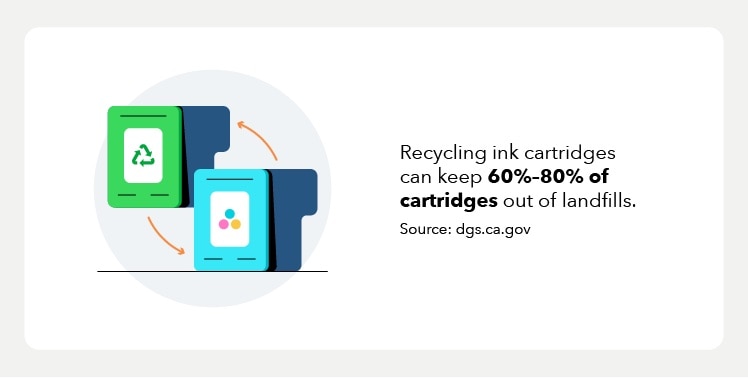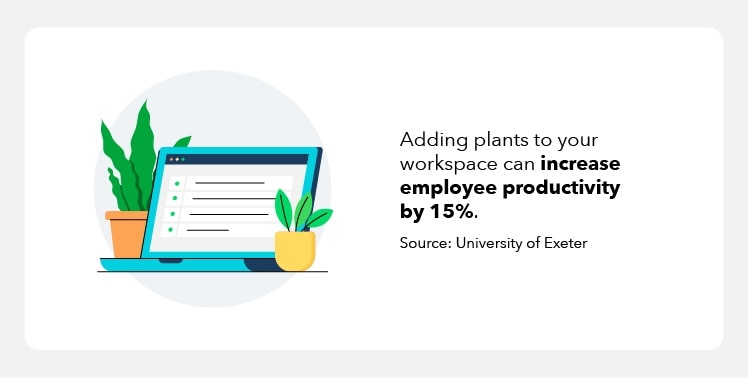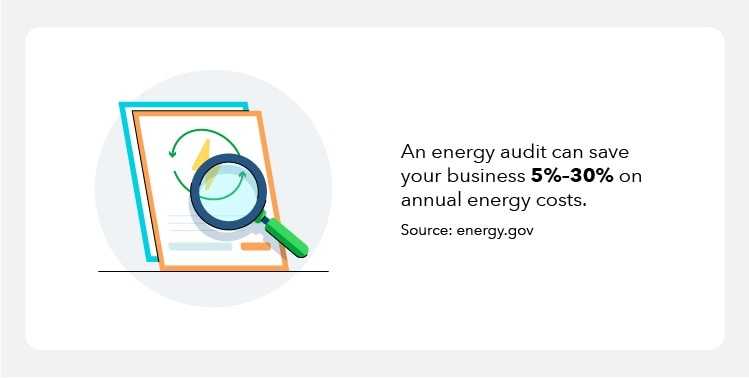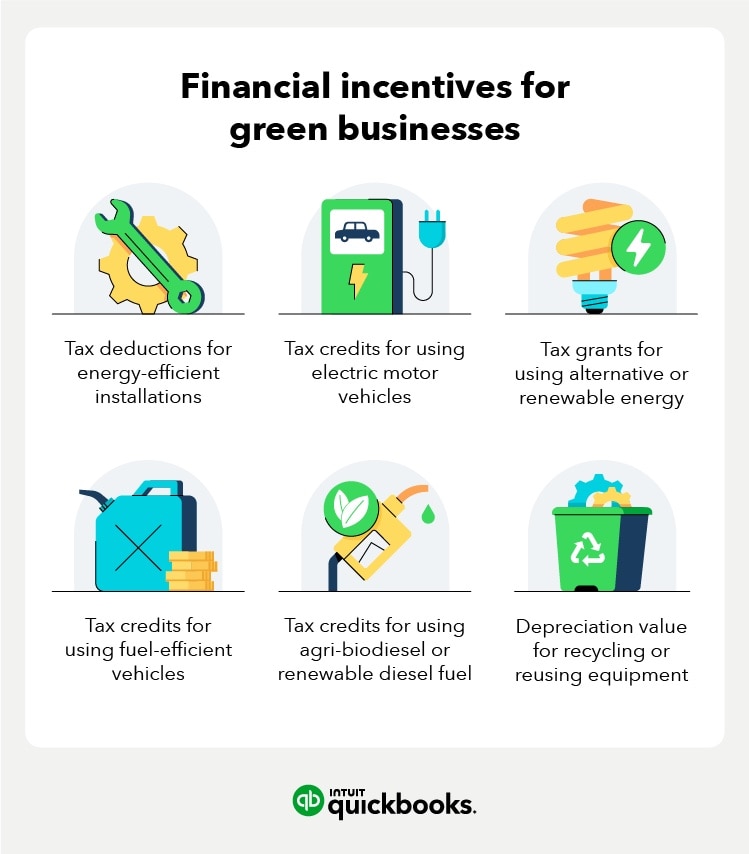 Businesswoman working at her desk" />
Businesswoman working at her desk" /> Businesswoman working at her desk" />
Businesswoman working at her desk" />
Creating a sustainable small business takes effort, planning, and dedication—but the payoff can be massive for your business, the planet, and future generations. Looking to the future through green-colored lenses, SMBs understand how essential practicing sustainability can be. According to a recent survey commissioned by QuickBooks, 72 percent of small businesses believe sustainability is very or extremely important for the economy.
But is it possible for your business to reduce its carbon footprint and make a positive impact without completely overhauling your budget and how you operate? Yes, there are many different ways to achieve this. Our guide to going green in business can help you learn how to become more sustainable—and save a few bucks along the way.
Green businesses—or green companies—embrace sustainable operations, production, and sourcing. You can officially certify your business as green by meeting certain sustainability criteria.
The goal of a green or eco-friendly business is to reduce or eliminate any negative impact they have on the environment, both locally and globally. A green business often exhibits core traits like:
Achieving these goals to become a green business doesn’t have to break the bank. Becoming a green small business offers some financial benefits to help you maintain a profit while helping the world.
Want some green business ideas? Follow these tips to help you make the world—and your bank account—greener:
Our in-depth tips below will show some estimated savings. The savings potential for each tip ranges from modest ($) to significant ($$$), depending on factors like industry, effort, investment, and strategy.
Contrary to the popular myth , booting up a computer uses less energy than leaving it on. Powering down your equipment and turning off your power strip every night before leaving the office reduces energy consumption. Though saving only a few watts per night sounds small, the savings can add up, especially for bigger businesses with a lot of equipment.
If it’s hard to remember to turn your computer off, adjust the settings related to “sleep” and “hibernate” modes. These will allow you to set the monitor to go dark after a set period of time, in case you forget to do it manually.
Paper and cardboard account for 26 percent of landfill waste . Going digital and migrating to a paperless office reduces your carbon footprint, saves paper, and eliminates your contribution to deforestation.
There are two benefits to switching to online invoicing software and emailed bills: First, you cut down on the amount of paper you use, and second, faster delivery means faster payments. You can start making online invoices with this free invoice generator .
Sometimes printing can’t be avoided. In those cases, choose sustainable options. For example, print eco-friendly business cards on recycled paper.
If you haven’t looked into the productivity benefits of cloud solutions, now is a perfect time. Google Drive is easy to implement, allowing you to share documents, spreadsheets, and presentations. The in-document annotation features make it easy for colleagues to collaborate, add notes and suggest changes while avoiding the waste of paper and ink that a printer generates.
You can do the same thing with your accounting , plus there’s an added benefit of better data security and easier accessibility, compared to physical options.

An unbelievable amount— 60% to 80% —of all used toner cartridges get thrown out and end up in landfills where it takes them 1,000 years to decompose.
Recycling your toner cartridges eliminates unnecessary waste and can also earn you money. Many toner suppliers offer discounts or cash-back promotions for buying recycled cartridges and returning used ones. Even the big box stores offer these discounts.
Strive to be a zero-waste business by revamping your break room. You can start by investing in reusable materials like dishes, silverware, and coffee mugs to eliminate wasteful, single-use items. You can even ask your employees to donate dishes to the company kitchen.
While energy-saving appliances are a huge cost saver to small businesses and commercial builders alike, common sense solutions—like policies to only run a dishwasher when it’s full—are a simpler starter point. If you lease your office space, perhaps ask the management company if they could replace an older model dishwasher or refrigerator for a “green” model.
Replace all of your light bulbs with energy-efficient lighting options . Though CFL and LED lights cost more initially than standard incandescent bulbs, they last longer, use less energy, and save you money in the long run.
Look for the Energy Star symbol when upgrading your computers, monitors, phones, and audio or video equipment. If you own your business space and have the know-how, you can receive a tax deduction for installing solar panels. However, you must meet certain standards , so do your homework before beginning work or investing in materials.

Adding office plants creates a welcoming environment that boosts morale, leads to productivity, and improves indoor air quality . Research shows that adding plants to your office increased employee satisfaction and led to a 15% boost in productivity . Several types of low-maintenance plants can thrive in office environments and many don’t require frequent watering like succulents, orchids, and spider plants.
Many companies have adopted hybrid or fully remote options so employees can work from anywhere. Employee productivity can increase in situations where telecommuting programs are in place. Employees working from home get more done, period.
Technology has also allowed businesses to bring together people from all over the world in one virtual room. Taking advantage of videoconferencing and remote work options cut unnecessary travel and commuting, reducing harmful exhaust puffing its way into the atmosphere.
You can save money on brick-and-mortar office space and utilities with a fully remote workforce and eliminate travel expenses like transportation, hotel, and meal costs.
Promoting a culture rooted in sustainability and establishing yourself as a green business can create a loyal customer base that prioritizes those values in brands they buy from. Customer loyalty leads to repeat business, more sales, and recommendations to friends and family.
Internally, a green culture can attract employees who align with your values. When employees love the company they work for, they feel valued and have less incentive to look for outside roles. Keeping employees is more cost-effective than replacing them, not to mention your current staff working harder for a business they believe in.

Conducting an energy audit through your power supplier can help you identify ways to save energy and money. Some ways to save include updating equipment, shifting energy use to off-peak hours, or leveraging renewable energy sources. After getting recommendations, find out if there are any incentives or rebates available for the changes your business makes.
You can also track sustainability improvements, like energy, water, and waste reductions. With QuickBooks, this is just as easy as tracking your sales and expenses.
Partnering with other green businesses c reates a team working toward the same sustainable goals. You can combine efforts to maximize shipping space, reduce trips, and optimize routes to help your businesses profit while doing your part for a better planet.
If you can, source from local, environmentally friendly businesses to create a shorter, sustainable supply chain , and reduce carbon and shipping costs.
Finally, it’s smart for companies going green to create programs that promote the 5 Rs in your workplace. Be mindful of your consumption habits to reduce waste from disposable, unrecyclable plastics. Reuse or repurpose materials like cardboard, cans, or bottles.
Refuse materials you know are harmful to the environment, like plastic straws and water bottles. Take advantage of programs from your city that help you find ways to start composting, aka rot . And, of course, practice recycling .

Companies that make an effort to become green businesses can take advantage of financial incentives like tax breaks and subsidy benefits from the government.
Consumers, especially younger generations, are placing more value on eco-friendly practices than ever before. In fact, a study by PDI Technologies showed that 80 percent of adults (from 18-34) are willing to pay more for sustainable brands over their less-eco-friendly companies.
Aligning with consumers on sustainability lets you work together as a community toward the same goals. Once you’ve begun to see the benefits of these eco-friendly improvements, you can start helping others to build a community of companies for sustainability.
If you feel like one small business doesn’t make a difference, imagine the impact two, three, or an entire town’s worth of businesses going green could make.
Set the example. The path to building greener, sustainable businesses has to start somewhere—so why not with you?

Explore the many ways to manage your cash flow with QuickBooks.
Start here Recommended for you
What are carbon offsets and does your business need them?
October 26, 2021

5 ways small businesses can prioritize sustainable shipping
October 20, 2021

How to measure your business’s carbon footprint
September 29, 2021
We provide third-party links as a convenience and for informational purposes only. Intuit does not endorse or approve these products and services, or the opinions of these corporations or organizations or individuals. Intuit accepts no responsibility for the accuracy, legality, or content on these sites.
**Product information
QuickBooks Live Assisted Bookkeeping: This is a monthly subscription service offering ongoing guidance on how to manage your books that you maintain full ownership and control. When you request a session with a Live Bookkeeper, they can provide guidance on topics including: bookkeeping automation, categorization, financial reports and dashboards, reconciliation, and workflow creation and management. They can also answer specific questions related to your books and your business. Some basic bookkeeping services may not be included and will be determined by your Live Bookkeeper. The Live Bookkeeper will provide help based on the information you provide.
QuickBooks Live Full-Service Bookkeeping: This is a combination service that includes QuickBooks Live Cleanup and QuickBooks Live Monthly Bookkeeping.
1. QuickBooks Online Advanced supports the upload of 1000 transaction lines for invoices at one time. 37% faster based off of internal tests comparing QuickBooks Online regular invoice workflow with QuickBooks Online Advanced multiple invoice workflow.
2. Access to Priority Circle and its benefits are available only to customers located in the 50 United States, including DC, who have an active, paid subscription to QuickBooks Desktop Enterprise or QuickBooks Online Advanced. Eligibility criteria may apply to certain products. When customers no longer have an active, paid subscription, they will not be eligible to receive benefits. Phone and messaging premium support is available 24/7. Support hours exclude occasional downtime due to system and server maintenance, company events, observed U.S. holidays and events beyond our control. Intuit reserves the right to change these hours without notice. Terms, conditions, pricing, service, support options, and support team members are subject to change without notice.
3. For hours of support and how to contact support, click here.
4. With our Tax Penalty Protection: If you receive a tax notice and send it to us within 15-days of the tax notice we will cover the payroll tax penalty, up to $25,000. Additional conditions and restrictions apply. See more information about the guarantee here: https://payroll.intuit.com/disclosure/.
Terms, conditions, pricing, special features, and service and support options subject to change without notice.
QuickBooks Payments: QuickBooks Payments account subject to eligibility criteria, credit, and application approval. Subscription to QuickBooks Online required. Money movement services are provided by Intuit Payments Inc., licensed as a Money Transmitter by the New York State Department of Financial Services. For more information about Intuit Payments' money transmission licenses, please visit https://www.intuit.com/legal/licenses/payment-licenses/.
QuickBooks Money: QuickBooks Money is a standalone Intuit offering that includes QuickBooks Payments and QuickBooks Checking. Intuit accounts are subject to eligibility criteria, credit, and application approval. Banking services provided by and the QuickBooks Visa® Debit Card is issued by Green Dot Bank, Member FDIC, pursuant to license from Visa U.S.A., Inc. Visa is a registered trademark of Visa International Service Association. QuickBooks Money Deposit Account Agreement applies. Banking services and debit card opening are subject to identity verification and approval by Green Dot Bank. Money movement services are provided by Intuit Payments Inc., licensed as a Money Transmitter by the New York State Department of Financial Services.
QuickBooks Commerce Integration: QuickBooks Online and QuickBooks Commerce sold separately. Integration available.
QuickBooks Live Bookkeeping Guided Setup: The QuickBooks Live Bookkeeping Guided Setup is a one-time virtual session with a QuickBooks expert. It’s available to new QuickBooks Online monthly subscribers who are within the first 30 days of their subscription. The QuickBooks Live Bookkeeping Guided Setup service includes: providing the customer with instructions on how to set up chart of accounts; customized invoices and setup reminders; connecting bank accounts and credit cards. The QuickBooks Live Bookkeeping Guided Setup is not available for QuickBooks trial and QuickBooks Self Employed offerings, and does not include desktop migration, Payroll setup or services. Your expert will only guide the process of setting up a QuickBooks Online account. Terms, conditions, pricing, special features, and service and support options subject to change without notice.